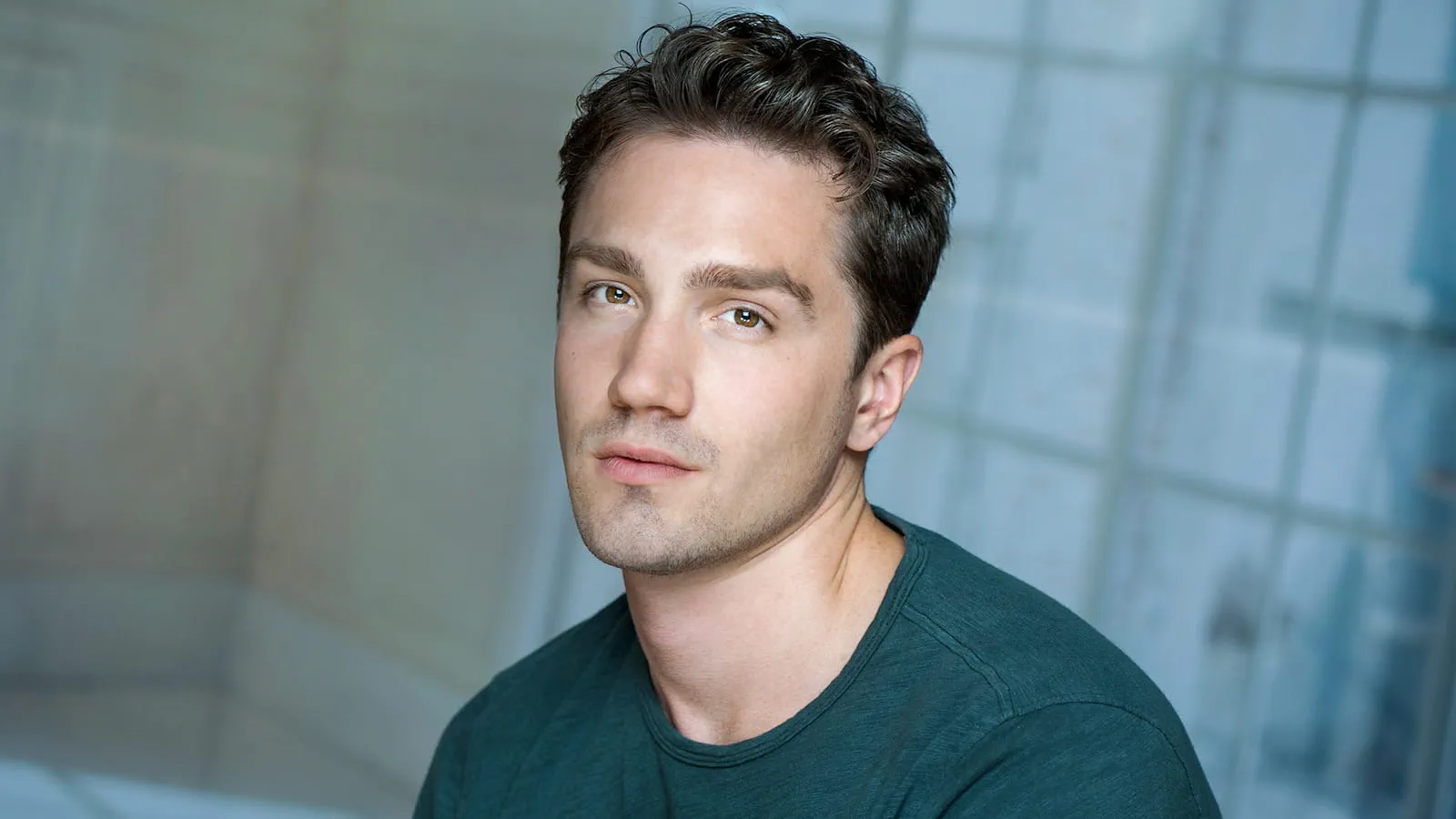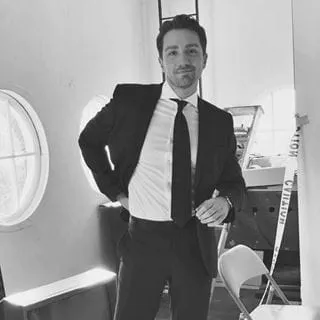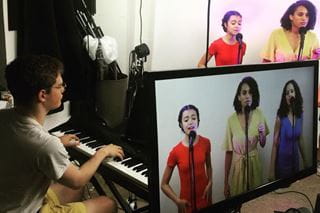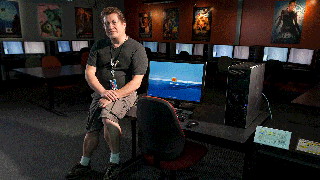
Jack of many trades
 by Meagan Kashty – Jun 8, 2019
by Meagan Kashty – Jun 8, 2019

Jake Foy’s entry into acting was an inevitability.
Even as a child, he vividly remembers creating characters and acting out scenes, focused on using performance as a medium for connecting people through storytelling. It should come as no surprise that now as an adult, Foy (Music Theatre '13) continues to tell stories in new and creative ways.
Whether it be journeying on a space odyssey in the feature film Star Trek Beyond, ruling over Scotland as King James in the series Reign, or as Felix Silva in the upcoming third season of Designated Survivor Foy’s acting roles have been as varied as his career path. At the moment, he’s on the West coast shooting his first starring role as Charlie Warren in the romantic comedy Eat, Drink & Be Married.

Along with director, producer and actor, Foy is adding entrepreneur to his resume. Returning to his musical theatre roots, last year he founded a new production company – Third Paul Productions - specializing in movie-musical content. He, along with some former Sheridan classmates, are producing their second musical short, set to be released later this year.
Here, Foy steps away from the camera to chat about how he got his start, and what it’s like being a Canadian actor breaking into the entertainment industry:
What sparked your interest in acting and musicals?I think I’ve just always loved storytelling, particularly musical storytelling. My mom always tells the story of a day she ran into the living room in a panic when she thought she heard a conversation between a stranger and my three-year-old self. She still laughs at how surprised she was to find it was just me, alone, reading a book in character voices. I think performance was something that was born into me, like it or not. As my mom would say, “You don’t shape them, you just unwrap them.”
Anyway, I wasn’t raised in a very musical household, but my parents had a recording of [the musical] Les Misérables that they would play on long car rides. When they eventually brought me to see a touring production of it in Toronto for my 16th birthday, everything changed.
When did you decide to study theatre professionally?Once music theatre is in your heart it’s difficult to undo – you’ll hear that from a lot of “show people”. I applied and auditioned for [Sheridan’s Music Theatre program] right out of high school and was waitlisted. At the time, I was really new to theatre and had almost no training in music or dance. I was proud of myself for having earned my spot on the waitlist, but at 17, I convinced myself that if I wasn’t accepted outright, then it wasn’t the right path for me. I did two subsequent years of study at other colleges in architecture, then advertising, but I kept sneaking out of class for singing lessons and to audition in Toronto. None of the programs I was taking held the same place in my heart as musical theatre, and I eventually came to terms with the fact that I’d have to try my odds at Sheridan again.
Why Sheridan?The quality of the education, particularly in the music theatre discipline, is world renowned, even more now than it was when I auditioned. The reputation for the learning you’d receive from the music theatre faculty was unparalleled. There are of course other schools that offer triple-threat training, but the industry is so competitive. I felt that if I couldn’t get the absolute best education, it wasn’t something I was going to invest my time and energy in.
How did your career ambitions change from when you were in school to now?My goals are always changing. I feel any healthy-minded artist is constantly evaluating if their passion still persists in order to motivate their next steps. When I began, I thought I’d be forever satisfied if I could eventually perform in the chorus of a show – any show – and be compensated for my work. I was a stranger to the industry, and I felt it’d be enough to do what I loved for a paycheque, at least once, no matter the role. As time passed, I found even more joy in working on camera. I can say, however, that I’ve always believed my calling would eventually manifest itself in directing musical content for cinema.
It sounds like you’re a bit of a jack of all trades."My goals are always changing. I feel any healthy-minded artist is constantly evaluating if their passion still persists in order to motivate their next steps."
I think that relates to my time at Sheridan. We were prepared to do so many things, and musical theatre requires three subdivided disciplines of acting, singing and dancing. So, within that experience, there are different shows and productions and different work opportunities that require one, both or all three of those skill sets. So yeah, the hats that I ended up wearing or have worn until this point in my career have been varied, just as they were when I was at school.

The time immediately following graduation was challenging for me. I certainly felt like I was a jack of many trades – but the industry was quick to remind me that I was a master of none. The program prepared me for work in the industry, but I think a person needs time to prepare their heart and mind for the reality of how that industry affects them individually as well. I found representation and started auditioning, but it was really my introspection and self-reflection that tailored my focus and helped me to make critical career decisions.
What kinds of decisions were you faced with?Two years after graduating I found myself at a crossroads between continuing to pursue a career in Toronto, or uprooting my career to Vancouver to focus my energy on screen work. Because of my long-term goals for directing film musicals and the knowledge I felt l needed to gain on screen, I went West for a time. My time in Vancouver brought some big career highlights though – I found myself working on Star Trek Beyond (2016) with Zachary Quinto, who had just finished his run of The Glass Menagerie on Broadway, and Chris Pine had just released the film musical of Into The Woods (2014), directed by one of my idols, Rob Marshall. Spending time with such heavyweight talent, on and off set, was thrilling.
I also directed my first theatrical production at the University of British Columbia that year – a production of God of Carnage by Yasmina Reza. The show was also a charitable initiative, raising money for a charity called Hope Air, which arranges free transportation and accommodation for people from rural areas to urban centres for healthcare.
Can you talk a bit about what it’s like to be a Canadian looking to break into the entertainment industry?I think it’s a great time to be a Canadian artist! The means of production are dramatically more accessible than ever, and with crowdfunding and more affordable equipment, producing can really be achieved by anyone with a smartphone, internet access and a captivating story. As far as the actual market is concerned, brand new studios are opening in cities across the country. Some of the most decorated projects in theatre, television and film are being produced by Canadian artists. Consider projects such as the musical Come From Away, the TV series The Handmaid’s Tale or the Oscar-winning The Shape of Water — all of which had Canadian, and Sheridan connections. In my opinion, there’s only more to come from Canadian artists and performers. I count myself lucky to call myself one of them.
Media Contact
For media inquiries, contact Sheridan’s Communications and Public Relations team.





